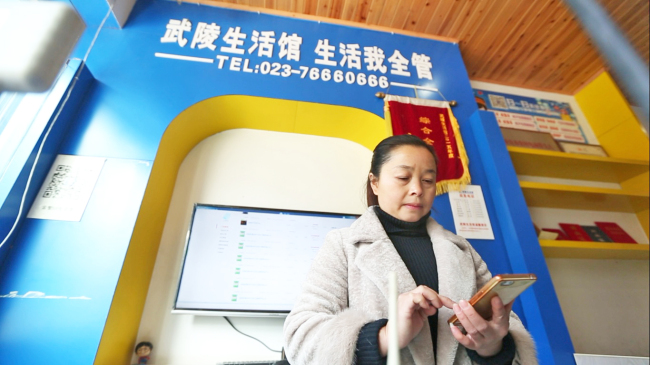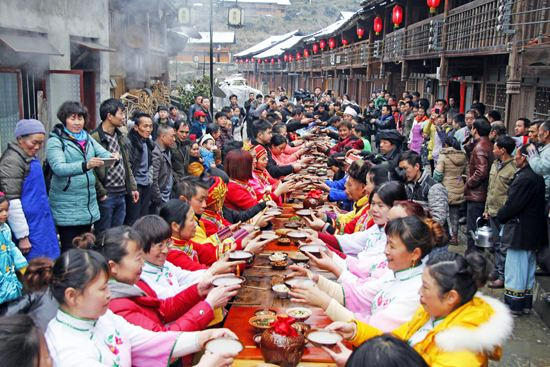E-commerce brings new life to farmers in southwest China

Zhang Min in her "Wuling Life House". [Photo: ChinaPlus/ Lu Chang]
Building a digital economy is high on the agenda of the Chinese government and efforts are being put into optimizing the agricultural industrial chain and encouraging people to start new businesses in rural areas.
The aim is for more people to establish these rural businesses through online platforms because it's widely believed that the success of E-commerce can help China realize its goal of lifting 70 million of people in underdeveloped areas out of poverty by 2020.
CRI’s reporter Lu Chang finds out how an E-commerce platform is raising people's living standards in southwest China's Xiushan County.
Wang Lei voices her report.

Zhang Min, online shop owner and the manager of "Wuling Life House" in Hongan, southwest China's Xiushan county. [Photo: ChinaPlus/ Lu Chang]
It's 8'o clock in the morning. The sun is shining over Hongan, an ancient river town in Southwest China's Xiushan Tujia and Miao Autonomous County.
48-year-old Zhangmin has just finished her morning farm work, and now it's time to open her roadside shop for the day's business.
"The first thing I do every morning in my store is to turn on the computer, and check for new online orders. Then I contact my customers, coordinate with delivery people and finish the orders. I can also process them through my smartphone."

Zhang Min helps local villager with rural financial services in her "Wuling Life House". [Photo: ChinaPlus/ Lu Chang]
Zhang Min is an adept computer and mobile user. Like many of her fellow villagers living in such a mountainous region - where several years ago transportation was so inconvenient, it's hard to believe that she once lived a relatively hard life.
"We used to depend entirely on farming, which was also completely weather-dependent and so we had very little income. I tried different business ideas, like selling feed, selling clothes, bringing my farm products to the fair in the town, but still remained poor for years. Throughout the year, I lived from hand to mouth - with nothing extra left."
Things changed after the local government launched an e-commerce platform 3 years ago.
Since then, long-distance transportation, logistic costs and storage conditions for fresh produce have become less of an inconvenience largely thanks to a road network that was built at the same time.

Workers busy packging fresh fruits in "Yun Cang", the logistics center of Xiushan county. [Photo: ChinaPlus/ Lu Chang]
"I had no idea about the so-called 'E-commerce' then, and so I was not sure if I could handle it. At that time I even couldn't type as I was a total stranger to computers. I learned what e-commerce was through the government's campaign. The teachers taught us how to manage an online shop step-by-step, that's how I found out that it's possible my products could be sold across the country! I learned how to use a computer in 2015, and opened my online store on the "Cuntou" platform in 2016. Now they sell really well."
Zhang Min says her annual income in 2017 was more than a hundred thousand, nearly 10 times as much as that of the country's average annual income per farmer.

Che Yuxin, the head of Yunzhi Science and Trade Company. [Photo: ChinaPlus/Lu Chang]
Che Yuxin is the head of Yunzhi Science and Trade Company in Xiushan County.
"Training modern farmers can be a key issue among the three main obstacles for rural e-commerce; including logistics, products and rural talents. Here in Xiushan, we use a similar model as that of "The open-air banquet" - a typical Tujia tradition - to teach e-commerce."
"The open-air banquet", or as locals call it -the "Liushui banquet", is a long standing Tujia tradition for festivals or celebrations.
At the banquet that can stretch to a distance of about 1.5 kilometers, dinner is continuously served as the guests slowly trickle in - one after another.

"The open-air banquet" is a Tujia tradition for festivals and celebrations. [Photo: People.cn]
And just like people come and go at any time and still be served at the banquet, farmers can also come at their convenient time for their training at the center.
"...Which means there are always classes and teachers available at the training center where farmers can come and learn more at all times in an entertaining way. In this way we solve the problem of the farmer's different cultural standards and non-stationary studying hours."
And Xiushan's success on rural e-commerce is more than just a site-specific training model. Comprehensive rural service stations named "Wuling Life House" have been built around the county, where villagers can receive express delivery, ask for online shopping services, apply for rural business financing, learn various techniques and order tickets online.

More than 200 "Wuling Life Houses" have been established in Xiushan county, offering convinient services to local villagers. [Photo: ChinaPlus/ Lu Chang]
As a manager of "Wuling Life House", Zhang Min's shop is busy throughout the day - and she enjoys every aspect of her life as a village "broker".
"Being a manager of my 'life house' is just like being a 'broker' for the villagers, I'm so happy to help them solve their problems, be it about work or their general life. Taking the lead and teaching them how to use the Internet has not only given me satisfaction, it also has made my shop very popular."
Currently there are more than 200 "Wuling Life Houses" spread out in nearly every village in Xiushan County.
In 2017, most of the county's agricultural products were sold through e-commerce platforms raking in some 850 million yuan, or 135 million US dollars. That made up a staggering 52% growth compared with the 2016 total revenue.
As a result, Xiushan's name was officially crossed out from the country's poverty-stricken-counties list in late 2017, with incidences of poverty reported at merely 1.2%.
Cao Zhong, a government official from the local poverty relief office says e-commerce has played a crucial role during the process of leaving poverty behind.
"Through the online to offline chain, e-commerce has largely shortened the distance between companies, customers and farmers. It's much easier for us to bring investments and build local brand of natural, organic agricultural products and cultural tourism products."

Zhang Min and her husband Li Tingjun. [Photo: ChinaPlus/ Lu Chang]
Talking about the future, Zhang Min smiles with confidence and says she is optimistic that life will keep on being better and better. For this diligent Tujia business woman, there is no room for fear in her heart - just the urge to keep empowering herself to go even further.
"Chances are everywhere if you dare to think and do it. How would you know it's impossible if you even dared not to try? Of course there are challenges, but being bold and brave and dreaming what you want to dream, those hurdles will vanish and opportunities will appear."

Hongan river town of southwest China's Xiushan Tujia and Miao Autonomous County. [Photo: ChinaPlus/ Lu Chang]





